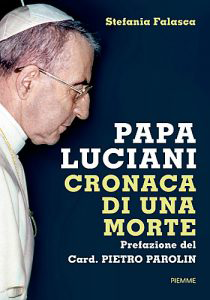The page attracted my immediate attention because Pope John Paul I’s all-too-short reign has always fascinated me. I’m not your run-of-the-mill conspiracy theorist looking under every rock on every grassy knoll so I’m inclined to believe the official version that he died of a heart attack in bed on Sept. 28, 1978.
But there are many inconsistencies in the record that point to the possibility of foul play. No need to go over them here, but he was only 65 and had been given a clean bill of health only days before.
He had also publicly stated he wanted to clean up the Vatican Bank and its alleged ties to the Mafia and illegal activities. In other words, powerful people had motivation to see him replaced, and a dozen previous popes in history had been killed. There are many books — including 1980s best-seller In God’s Name by David Yallop that reads like a murder mystery — that speculate the pope was likely poisoned. In this new book, released in Italian this month, Pope Luciani: Chronicle of a Death, Italian journalist Stefania Falasca is said to debunk the conspiracies.
There are many books — including 1980s best-seller In God’s Name by David Yallop that reads like a murder mystery — that speculate the pope was likely poisoned. In this new book, released in Italian this month, Pope Luciani: Chronicle of a Death, Italian journalist Stefania Falasca is said to debunk the conspiracies.
One of the biggest points Falasca makes to discredit the plots is with new information that the so-called “smiling pope,” whose given name was Albino Luciani, was found by nuns at 5:15 a.m. in bed, his arms outside his sheets, holding papers. His bedside light was on, he was still wearing his reading glasses, nothing had fallen to the floor and there were no signs of thrashing about or disturbance.
A physician friend told me this could easily occur through abnormal electrical activity with the heart, and one of the common deadly types is called ventricular tachycardia. It is a quick and painless death. But, he said, in no way does it disprove death through poison or suffocation, either, especially with no autopsy performed. Ventricular tachycardia wouldn’t show up in an autopsy anyway because the heart muscle isn’t damaged, merely turned off like a light switch.
Enough about the conspiracies. The other thing that intrigued about that page in The Register was the sidebar of quotes from John Paul I. In his short reign, John Paul gave 19 speeches and each quote and folksy story reminds me of Pope Francis and some of the things he has said over the last few years.
John Paul I talks about defects and shortcomings within the Church that should never get in the way of our affection for it. Francis has often warned of the dangers of clericalism.
“The Son didn’t join the game of these people: The Son went with the sick, the poor, the discarded, the publicans, the sinners — and that is scandalous — the prostitutes. Today, too, Jesus says to all of us, and even to those who are seduced by clericalism: ‘The sinners and the prostitutes will go before you into the Kingdom of Heaven,’ ” Francis said last December.
On non-believers, John Paul talks about how he was near to many and they didn’t fight against God, “but against the mistaken idea they have of God.” In other words, if one doesn’t believe, one is not necessarily a bad person.
On Vatican Radio in May 2013, Francis said this: “The Lord created us in His image and likeness, and we are the image of the Lord, and He does good and all of us have this commandment at heart, do good and do not do evil. All of us. ‘But, Father, this is not Catholic! He cannot do good.’ Yes, he can...
“The Lord has redeemed all of us, all of us, with the Blood of Christ, all of us, not just Catholics. Everyone! ‘Father, the atheists?’ Even the atheists. Everyone! We must meet one another doing good. ‘But I don’t believe, Father, I am an atheist!’ But do good: We will meet one another there.”
On humility, John Paul talks about how we are all “servants” and should never put ourselves on display, despite how many great things we may have done in our lives.
At a surprise appearance in the TED talk conference last April, Francis said this: “Please, allow me to say it loud and clear: The more powerful you are, the more your actions will have an impact on people, the more responsible you are to act humbly.”
There seem to be so many similarities between the two popes, although the world never got to know John Paul I as it has with Francis. Both seem to have something in common with another pontiff, the Middle Ages pope St. Nicholas I the Great.
At the time of Nicholas, the empire of Charlemagne had fallen to pieces and Christian territory was threatened both from the North and the East. It seemed Christendom was on the brink of anarchy. Nicholas was a man who pursued the course of justice; he fired powerful errant bishops and defended the rights of the common man.
John Paul and Francis have been worthy successors to the causes.
(Brehl is a writer in Port Credit, Ont., and can be reached at bob@abc2.ca, or @bbrehl on Twitter.)


